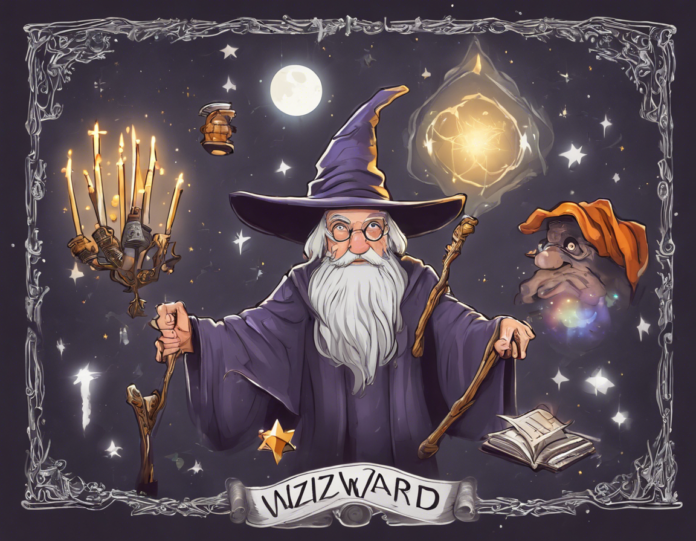Introduction
Wizards have always captured the imagination and fascination of people around the world. From ancient times to pop culture depictions, these spellcasting individuals have been an integral part of human storytelling and mythology. While wizards may be considered a product of fiction and fantasy by some, there are several historical figures who have been associated with the practice of magic and mysticism. In this article, we will explore 10 famous wizards throughout history who left a significant mark on the world with their knowledge, skills, and mysterious abilities.
1. Hermes Trismegistus
Hermes Trismegistus is a legendary figure in Western esotericism, blending the Greek god Hermes and the Egyptian god Thoth. He is attributed with the authorship of the Corpus Hermeticum, a series of texts that explore spiritual and philosophical topics. Hermes Trismegistus is considered the founder of alchemy and hermeticism, influencing numerous occult traditions.
2. Merlin
Merlin, also known as Myrddin in Welsh folklore, is a legendary wizard featured in Arthurian legend. He is often depicted as King Arthur’s advisor and mentor, possessing powers of prophecy, shapeshifting, and spellcasting. Merlin’s character has been portrayed in various works of literature, from Geoffrey of Monmouth‘s writings to modern adaptations in film and television.
3. John Dee
John Dee was a 16th-century English mathematician, astronomer, and occultist who served as an advisor to Queen Elizabeth I. Dee was known for his interest in alchemy, astrology, and scrying, a practice of seeing visions through crystal balls or mirrors. He claimed to communicate with angels and sought to understand the divine mysteries of the universe.
4. Paracelsus
Paracelsus, born Philippus Aureolus Theophrastus Bombastus von Hohenheim, was a Renaissance physician, alchemist, and philosopher. He revolutionized the field of medicine with his holistic approach and emphasis on the natural world’s healing properties. Paracelsus believed in the concept of the “doctrine of signatures”, where the appearance of plants indicated their medicinal uses.
5. Nostradamus
Michel de Nostredame, better known as Nostradamus, was a 16th-century French physician and seer. He is renowned for his book “Les Propheties,” a collection of cryptic predictions about future events. Nostradamus’s prophecies have garnered widespread interest and interpretation, with believers attributing his foresight to supernatural powers.
6. Aleister Crowley
Aleister Crowley, known as the Great Beast 666, was an influential occultist, ceremonial magician, and writer in the early 20th century. Crowley founded the religion of Thelema, which emphasized individualism, personal enlightenment, and magical practices. His esoteric teachings and rituals continue to inspire various occult groups and practitioners.
7. Baba Yaga
Baba Yaga is a prominent figure in Slavic folklore, often portrayed as a mysterious and powerful witch or sorceress. She resides in a hut that stands on chicken legs and is known for her capricious nature, challenging those who seek her wisdom or assistance. Baba Yaga represents the duality of life and is both a source of wisdom and a symbol of danger.
8. Morgan le Fay
Morgan le Fay is a legendary enchantress in Arthurian legend, known for her magical abilities and complex relationship with King Arthur. She is often depicted as a healer, shape-shifter, and wielder of powerful spells. Morgan le Fay’s character has evolved over time, from a benevolent sorceress to a manipulative antagonist in various Arthurian tales.
9. Circe
Circe is a character from Greek mythology, featured in Homer’s “The Odyssey.” She is a sorceress who has the ability to turn men into animals with her potions and spells. Circe’s island serves as a pivotal point in Odysseus’s journey, where he must navigate her magical realm to continue his quest. Her character embodies themes of transformation, temptation, and power.
10. Gandalf
Gandalf is a wizard from J.R.R. Tolkien‘s “The Lord of the Rings” series, renowned for his wisdom, leadership, and magical prowess. As a member of the Istari order, Gandalf plays a crucial role in the fight against Sauron and the forces of darkness. His character exemplifies the archetype of the wise and benevolent wizard, guiding the Fellowship on their quest.
FAQs
1. Were all wizards portrayed as good in history and literature?
While many wizards in history and literature are depicted as wise and benevolent figures, there are also instances of dark or malevolent wizards. Characters like Morgan le Fay and Baba Yaga exemplify the complex nature of wizardry, where motives and actions may not always align with traditional notions of goodness.
2. Did historical wizards really have magical powers?
The existence of actual magical powers among historical figures considered wizards is a matter of interpretation and belief. While John Dee and Nostradamus were renowned for their prophetic abilities, the nature of their skills remains a topic of debate among scholars and enthusiasts.
3. How did wizards influence ancient societies and cultures?
Wizards and practitioners of magic played significant roles in ancient societies by serving as advisors, healers, and spiritual guides. Their knowledge of herbalism, astrology, and mysticism contributed to the development of early scientific and philosophical thought.
4. What are some common traits associated with wizards in mythology?
Wizards in mythology are often portrayed as possessing wisdom, knowledge of arcane arts, and the ability to wield magical powers. They may function as mentors, tricksters, or potent adversaries, symbolizing the dualities of light and darkness.
5. How did popular culture shape modern perceptions of wizards?
The representation of wizards in popular culture, from books and movies to video games, has influenced modern perceptions of magic and wizardry. Characters like Gandalf from “The Lord of the Rings” and Merlin from Arthurian legend have become iconic symbols of wisdom and mystical abilities.
6. Can anyone become a wizard or practice magic?
The practice of magic and wizardry is often associated with specific traditions, rituals, and knowledge passed down through generations. While individuals can study and explore esoteric practices, becoming a wizard typically involves dedicated training, mentorship, and a deep understanding of mystical arts.
7. What is the difference between a wizard and a sorcerer?
The distinction between a wizard and a sorcerer varies across cultures and narratives. In general, a wizard is often portrayed as a learned practitioner of magic, relying on knowledge and study to cast spells. Meanwhile, a sorcerer may possess innate magical abilities or derive power from external sources like spirits or deities.
8. Are there any female wizards in history and mythology?
Yes, there are several female wizards in history and mythology, such as Morgan le Fay, Circe, and Baba Yaga. These enchantresses and sorceresses play pivotal roles in their respective tales, showcasing the diversity and complexity of magical beings across different cultures.
9. What role do wizards play in modern occult practices?
In modern occult practices, wizards may serve as archetypal figures or spiritual guides for practitioners of magic and mysticism. Their symbolism and teachings are often incorporated into rituals, spellwork, and meditative practices to facilitate personal growth and connection with mystical realms.
10. How has the concept of wizards evolved over time in literature and media?
The portrayal of wizards in literature and media has evolved from ancient mythological figures to nuanced character archetypes with diverse abilities and backgrounds. While traditional tropes of wise old mentors persist, modern interpretations often subvert expectations, presenting wizards as complex and multifaceted beings in storytelling.
In conclusion, wizards have left an indelible mark on human history and culture, shaping our perceptions of magic, mysticism, and the pursuit of knowledge. Whether as ancient seers or iconic literary figures, these enchanting individuals continue to captivate our imagination and remind us of the endless possibilities that lie beyond the mundane world.


Recent comments